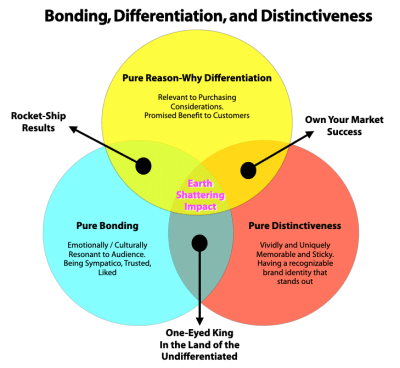
A colleague recently posted on “What NOT to Say In Your Advertising.”
And it’s well worth the read; you should check it out.
But it’s also worth digging deeper.
The best part of the post is the recommendation to make your ads zig when others zag, as ads that stand out from the crowd always punch above their weight.
But I’ve never cared much for the copywriters’ pastime of excoriating local advertisers for their clichéd ad-speak.
 First, it does little good to eliminate the bad unless you offer something better to take its place.
First, it does little good to eliminate the bad unless you offer something better to take its place.
Finally and most importantly, it’s not enough to address surface symptoms without diagnosing and fixing root causes.
Presuming that owners of businesses profitable enough to afford mass media advertising are neither stupid nor lazy, one has to ask:
Why would these bright, motivated business owners default to the use of this kind of blah-blah-blah language in the first place?
What’s pushing them — and maybe you — in the wrong direction in the first place?
The answer, of course, is false assumptions and misperceptions haunting the heads of these business owners (and most so-called advertising professionals).
And there are three of them, with the first being:
Assuming You Have to Rationally Explain Why You’re Better than the Competition
The false notion that one MUST have a “Unique Selling Proposition” damages more advertising than any other.
Most businesses simply don’t have a USP, and pretending as if yours does when it doesn’t will only ensure that your ads smell like bullshit.
This is why business owners and media sales reps fall back onto claims of:
- In business since
- Family owned
- Fast friendly service
- For all your ____ needs
- Etc
The sad thing is that not only do these phrases not convince anyone your business is better, they actually make you sound the same.
Worse still, they make you sound similarly untrustworthy and full of shit.
But the solution is NOT to simply stop using those phrases.
The real solution is to realize that you don’t need to rationally explain why you’re better than the competition in the first place.
If no one else in your industry has a legit USP, why should you be expected to?
Moreover, 99% of what you and everyone else buys is satisficed rather than maximized.
Customers want a good enough solution that requires little thinking, research, or energy, rather than an optimal solution requiring energy, time, and brain-cycles that they can’t spare.
Once you understand that, you’ll grasp the effectiveness of claiming simple virtue — of being “positively good” — rather than awkward attempts at creating faux-USPs.
 This is exactly what happened with:
This is exactly what happened with:
- Minivans
- Energy drinks
- Air Miles
- Cold-Filtered Beer
- Multi-blade razors
- Touch-screen phones
So building a long-term branding campaign SOLELY on the basis of a USP is a flawed strategy to begin with.
Instead, focus on bonding and a distinctiveness rather than rational reason-why differentiation and you won’t run into these kinds of problems.
If you’re not familiar with distinctiveness as an advertising term, it involves looking, feeling, and sounding unique, without that uniqueness attached to any objective claims of superiority.
And the path to distinctiveness always involves effective and zealous use of brand codes.
Assuming You Always Have to Talk Business In Your Ads
Simple truth:
Your business isn’t interesting — but YOU are.
And most people want to do business with people they know, like, and trust, rather than a faceless corporation.
This goes double for service-based businesses.
And triple for home-service businesses.
Doing business with strangers feels bad.
 You’re not in control, and you’re having to take the word of a stranger that, yes, you really do need to spend $$$ to fix or replace your sewer line / roof / AC system / Etc.
You’re not in control, and you’re having to take the word of a stranger that, yes, you really do need to spend $$$ to fix or replace your sewer line / roof / AC system / Etc.
Not good.
In these situations SOME connection always beats NO connection.
So why do your ads spend all their time talking about your business in transactional terms and so little time talking about YOU in human terms?
Why aren’t you telling people your stories?
Specifically, your origin story and other stories aimed at bonding with your prospective customers.
By letting your audience get to know you, you give them a connection that helps them trust you and your business — without having to talk all that much about your business.
And trust is the most important brand asset your business can ever possess.
As a bonus, not only will this give you an edge in acquiring customers, it’ll dramatically improve your ability to recruit talented employees.
Assuming Your Ads Should Sound Like Ads
No one wants to be average, yet everyone wants to be normal.
That’s as true in advertising as in life.
If you doubt it — and even if you don’t — just watch these Candid Camera conformity experiments:
In advertising, this manifests as business owners desiring cool, highly effective ads, while also recoiling at ads that don’t look or sound like “normal” ads.
 And that’s understandable; owners don’t want to come off as unprofessional.
And that’s understandable; owners don’t want to come off as unprofessional.
Or to be vulnerable in their storytelling.
So they conform to normal ads. And normal ads have ad-speak.
Moreover, most normal ads are transactional. To the point where quite a few ad professionals will consider any ad without a Call to Action to be a flawed ad.
Once you make peace with ads that sound and feel different, you’ll write, request, and demand much better ads — free of adspeak.
Putting This to Work for Your Business
First, the psychological and perspective re-set from reading this post should be beneficial, in and of itself — if you take the three lessons to heart.
Second, if you wish to write your own ads, the best next-step is to sign up for my Origin Stories Online Course at Wizard Academy.
That’s a biased recommendation, but I stand by it. No course will take your further down the road of story-based advertising in a single day than this one.
Third, if you want an advertising team capable of writing and producing story-based, bonding ads, you’ll want to hire a Wizard of Ads partner, preferably one skilled in this style of advertising.
- Getting a Foot in the Door — Of Perception - November 27, 2025
- What Digital Superstars Know About Offline Advertising - November 17, 2025
- Unmistakable: A Tale of Two Boots and Branding Done Right - November 8, 2025
